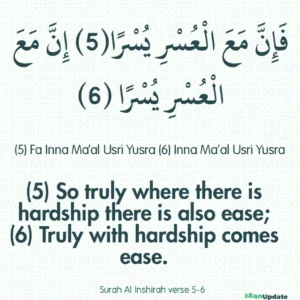8 Quran Verses About Mother in Arabic and English

In Islam, mothers are very important. The love between a mother and child is special and is the start of all life. The Quran and Hadith teach us to respect and care for our parents, especially our mothers. Here are 8 Quran Verses About Mother in Arabic with English translation.
Quran Verses About Mother in Arabic and English
Verse #1
وَقَضَىٰ رَبُّكَ أَلَّا تَعۡبُدُوٓاْ إِلَّآ إِيَّاهُ وَبِٱلۡوَٰلِدَيۡنِ إِحۡسَٰنًاۚ إِمَّا يَبۡلُغَنَّ عِندَكَ ٱلۡكِبَرَ أَحَدُهُمَآ أَوۡ كِلَاهُمَا فَلَا تَقُل لَّهُمَآ أُفٍّ وَلَا تَنۡهَرۡهُمَا وَقُل لَّهُمَا قَوۡلًا كَرِيمًا
And your Lord has decreed that you worship not except Him, and to parents, good treatment. Whether one or both of them reach old age [while] with you, say not to them [so much as], “uff,” and do not repel them but speak to them a noble word.
Surah Isra’ verse 23
The Quran teaches us to worship only Allah and treat our parents with kindness. Allah says we must worship only Him, without associating anyone else with Him.
We must also be good to our parents, as He commands us to be thankful to them and to Him. In Surah Luqman, verse 14, Allah teaches us to be respectful and grateful to our parents, especially as they grow older.
We should never speak to them disrespectfully, not even with a slight rebuke, like saying “Uff!” Instead, we should speak to them with honor, gentleness, kindness, and respect.
READ ALSO: 13 Verses Of The Quran About Death in Arabic with English Meaning
Verse #2
وَوَصَّيۡنَا ٱلۡإِنسَٰنَ بِوَٰلِدَيۡهِ إِحۡسَٰنًاۖ حَمَلَتۡهُ أُمُّهُۥ كُرۡهًا وَوَضَعَتۡهُ كُرۡهًاۖ وَحَمۡلُهُۥ وَفِصَٰلُهُۥ ثَلَٰثُونَ شَهۡرًاۚ حَتَّىٰٓ إِذَا بَلَغَ أَشُدَّهُۥ وَبَلَغَ أَرۡبَعِينَ سَنَةً قَالَ رَبِّ أَوۡزِعۡنِىٓ أَنۡ أَشۡكُرَ نِعۡمَتَكَ ٱلَّتِىٓ أَنۡعَمۡتَ عَلَىَّ وَعَلَىٰ وَٰلِدَىَّ وَأَنۡ أَعۡمَلَ صَٰلِحًا تَرۡضَىٰهُ وَأَصۡلِحۡ لِى فِى ذُرِّيَّتِىٓۖ إِنِّى تُبۡتُ إِلَيۡكَ وَإِنِّى مِنَ ٱلۡمُسۡلِمِينَ
And We have enjoined upon man, to his parents, good treatment. His mother carried him with hardship and gave birth to him with hardship, and his gestation and weaning [period] is thirty months. [He grows] until, when he reaches maturity and reaches [the age of] forty years, he says, “My Lord, enable me to be grateful for Your favor which You have bestowed upon me and upon my parents and to work righteousness of which You will approve and make righteous for me my offspring. Indeed, I have repented to You, and indeed, I am of the Muslims.”
Surah Ahqab verse 15

After emphasizing the importance of recognizing Allah’s oneness, worshipping Him sincerely, and obeying Him, Allah provides guidance on treating parents with kindness and respect.
This is mentioned in various parts of the Quran. Allah commands individuals to be dutiful and compassionate towards their parents. In one instance, Sa`d bin Abi Waqqas’ mother refused to eat or drink until he obeyed Allah’s command to honor his parents.
This led to the revelation of the verse, “And We have enjoined on man to be dutiful and kind to his parents.”
Allah highlights the mother’s sacrifices, bearing her child with hardship, enduring difficulties like fatigue, sickness, and pain during pregnancy, and delivering the child with even more hardship, suffering the intense pains of labor.
Verse #3
وَوَصَّيۡنَا ٱلۡإِنسَٰنَ بِوَٰلِدَيۡهِ حَمَلَتۡهُ أُمُّهُۥ وَهۡنًا عَلَىٰ وَهۡنٍ وَفِصَٰلُهُۥ فِى عَامَيۡنِ أَنِ ٱشۡكُرۡ لِى وَلِوَٰلِدَيۡكَ إِلَىَّ ٱلۡمَصِيرُ
And We have enjoined upon man [care] for his parents. His mother carried him, [increasing her] in weakness upon weakness, and his weaning is in two years. Be grateful to Me and to your parents; to Me is the [final] destination.
Surah Luqman verse 14
In this ayah, Allah mentions how the mother brings the child up, and how she gets tired and suffers stress from staying up with the child night and day, to remind the son of her previous kind treatment of him.
Verse #4
وَأُمِّهِۦ وَأَبِيهِ
And his mother and his father.
Surah Abasa verse 35
This verse describes a day when people will flee from their loved ones, including their brothers, mothers, fathers, wives, and children.
The terror will be so overwhelming that they will try to escape from those they normally hold dear.
According to Qatadah, people will flee from their most beloved relatives, then their next most beloved, and their closest kin, in that order, due to the immense horror of that day.
Verse #5
ٱلَّذِينَ يُظَٰهِرُونَ مِنكُم مِّن نِّسَآئِهِم مَّا هُنَّ أُمَّهَٰتِهِمۡۖ إِنۡ أُمَّهَٰتُهُمۡ إِلَّا ٱلَّٰٓئِى وَلَدۡنَهُمۡۚ وَإِنَّهُمۡ لَيَقُولُونَ مُنكَرًا مِّنَ ٱلۡقَوۡلِ وَزُورًاۚ وَإِنَّ ٱللَّهَ لَعَفُوٌّ غَفُورٌ
Those who pronounce thihar among you [to separate] from their wives – they are not [consequently] their mothers. Their mothers are none but those who gave birth to them. And indeed, they are saying an objectionable statement and a falsehood. But indeed, Allah is Pardoning and Forgiving.
Surah Mujadila verse 2
Allah emphasizes that no one can be considered a mother except the woman who gave birth to a child.
When a husband affectionately calls his wife “mother” or compares her to his mother, it’s a figure of speech, but it doesn’t make her his actual mother.
The only woman who holds the title of “mother” is the one who brought him into the world.
Verse #6
مَّا جَعَلَ ٱللَّهُ لِرَجُلٍ مِّن قَلۡبَيۡنِ فِى جَوۡفِهِۦۚ وَمَا جَعَلَ أَزۡوَٰجَكُمُ ٱلَّٰٓئِى تُظَٰهِرُونَ مِنۡهُنَّ أُمَّهَٰتِكُمۡۚ وَمَا جَعَلَ أَدۡعِيَآءَكُمۡ أَبۡنَآءَكُمۡۚ ذَٰلِكُمۡ قَوۡلُكُم بِأَفۡوَٰهِكُمۡۖ وَٱللَّهُ يَقُولُ ٱلۡحَقَّ وَهُوَ يَهۡدِى ٱلسَّبِيلَ
Allah has not made for a man two hearts in his interior. And He has not made your wives whom you declare unlawful your mothers. And He has not made your claimed [i.e., adopted] sons your [true] sons. That is [merely] your saying by your mouths, but Allah says the truth, and He guides to the [right] way.
Surah Ahzab verse 4
Verse #7
يُوصِيكُمُ ٱللَّهُ فِىٓ أَوۡلَٰدِكُمۡۖ لِلذَّكَرِ مِثۡلُ حَظِّ ٱلۡأُنثَيَيۡنِۚ فَإِن كُنَّ نِسَآءً فَوۡقَ ٱثۡنَتَيۡنِ فَلَهُنَّ ثُلُثَا مَا تَرَكَۖ وَإِن كَانَتۡ وَٰحِدَةً فَلَهَا ٱلنِّصۡفُۚ وَلِأَبَوَيۡهِ لِكُلِّ وَٰحِدٍ مِّنۡهُمَا ٱلسُّدُسُ مِمَّا تَرَكَ إِن كَانَ لَهُۥ وَلَدٌۚ فَإِن لَّمۡ يَكُن لَّهُۥ وَلَدٌ وَوَرِثَهُۥٓ أَبَوَاهُ فَلِأُمِّهِ ٱلثُّلُثُۚ فَإِن كَانَ لَهُۥٓ إِخۡوَةٌ فَلِأُمِّهِ ٱلسُّدُسُۚ مِنۢ بَعۡدِ وَصِيَّةٍ يُوصِى بِهَآ أَوۡ دَيۡنٍۗ ءَابَآؤُكُمۡ وَأَبۡنَآؤُكُمۡ لَا تَدۡرُونَ أَيُّهُمۡ أَقۡرَبُ لَكُمۡ نَفۡعًاۚ فَرِيضَةً مِّنَ ٱللَّهِۗ إِنَّ ٱللَّهَ كَانَ عَلِيمًا حَكِيمًا
Allah instructs you concerning your children [i.e., their portions of inheritance]: for the male, what is equal to the share of two females. But if there are [only] daughters, two or more, for them is two thirds of one’s estate. And if there is only one, for her is half.
And for one’s parents, to each one of them is a sixth of his estate if he left children. But if he had no children and the parents [alone] inherit from him, then for his mother is one third. And if he had brothers [and/or sisters], for his mother is a sixth, after any bequest he [may have] made or debt. Your parents or your children – you know not which of them are nearest to you in benefit. [These shares are] an obligation [imposed] by Allah. Indeed, Allah is ever Knowing and Wise.
Surah Nisa verse 11
The next few verses, including this one and the final noble verse in this Surah, contain essential knowledge about inheritance laws (Al-Fara’id).
These three verses, along with relevant Hadiths, form the basis of our understanding of inheritance rules. It is highly encouraged to learn and understand these specific principles mentioned in these verses.
Verse #8
وَأَصۡبَحَ فُؤَادُ أُمِّ مُوسَىٰ فَٰرِغًاۖ إِن كَادَتۡ لَتُبۡدِى بِهِۦ لَوۡلَآ أَن رَّبَطۡنَا عَلَىٰ قَلۡبِهَا لِتَكُونَ مِنَ ٱلۡمُؤۡمِنِينَ
And the heart of Moses’ mother became empty [of all else]. She was about to disclose [the matter concerning] him had We not bound fast her heart that she would be of the believers.
Surah Qasas verse 10
This verse highlights the overwhelming distress of Moses’ mother as she searches for her lost child. Allah describes how her heart becomes empty, consumed by the loss of her son.
She is so distraught that she can’t think of anything else, and is on the verge of revealing her secret – the loss of her child – to others.
Her grief is so intense that she almost gives in to her emotions, but Allah grants her the strength and patience to endure.






